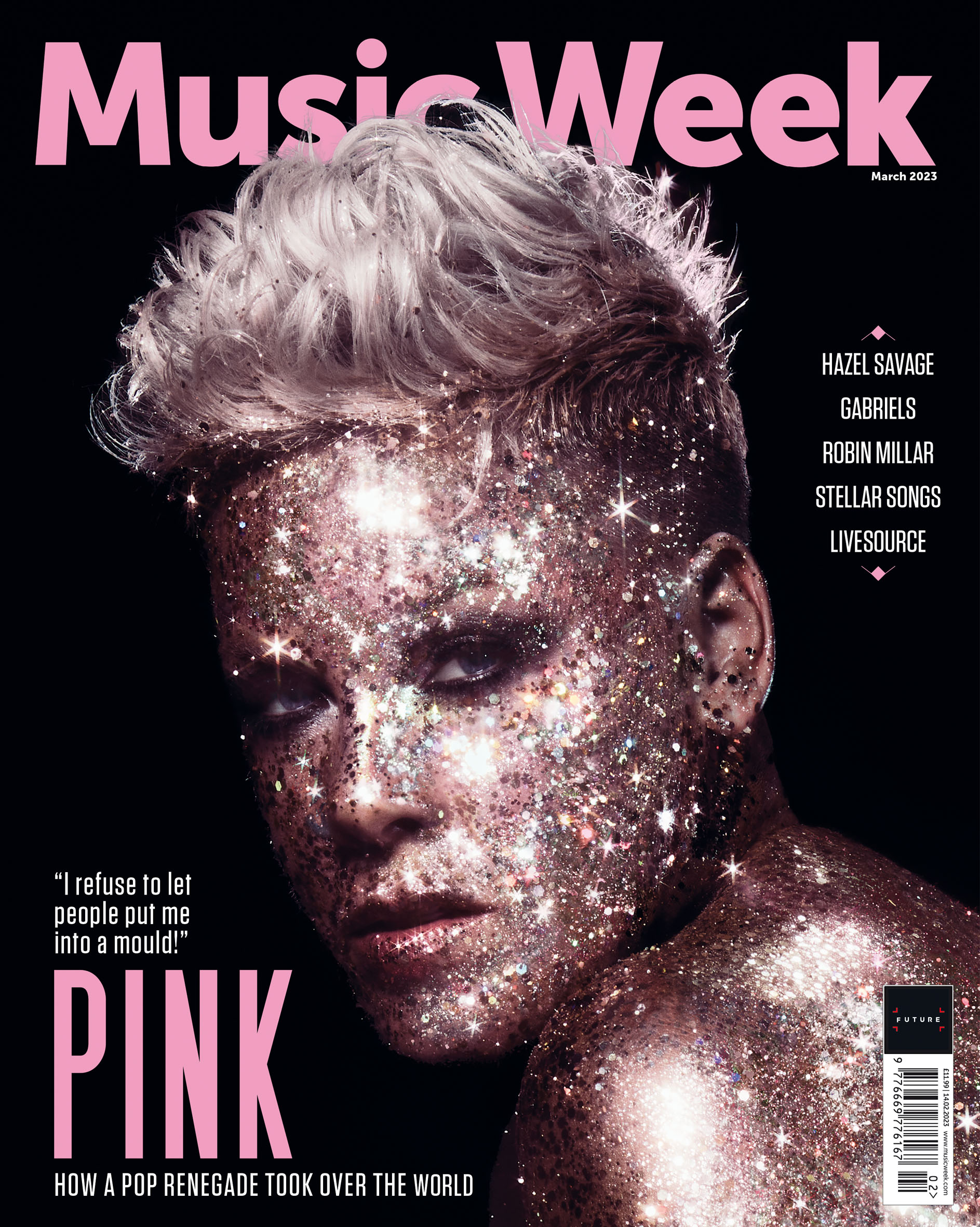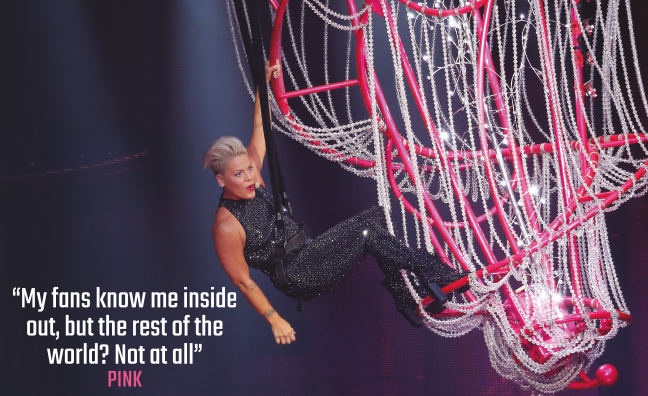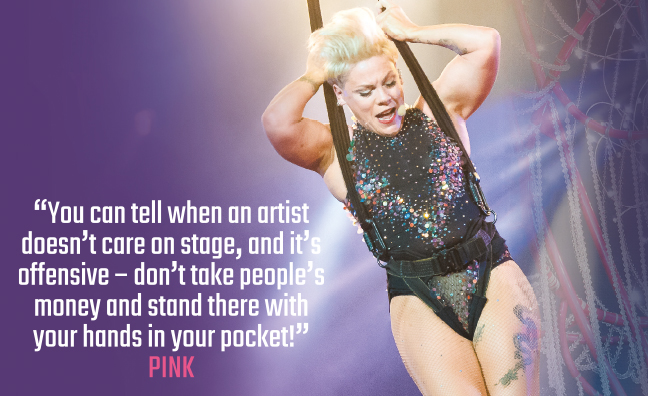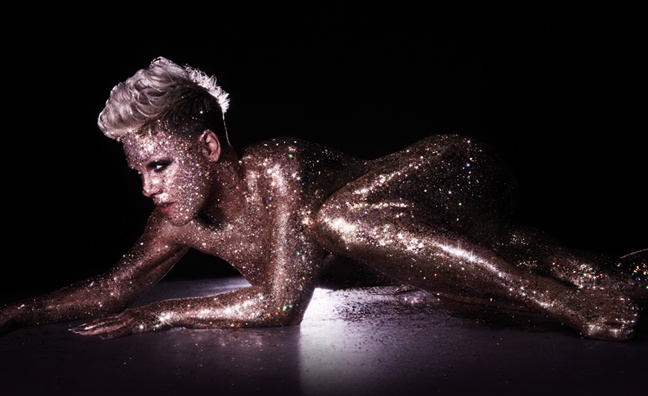Today, Pink releases her brilliant ninth studio album Trustfall, via RCA. Here, in some extracts from our new cover story, she reflects on its creation, looks back at her career and remembers the time she tried to manage herself...
Pink is, undoubtedly, one of the most successful artists in the world, but as she told Music Week in our new cover story, it wasn’t always that way.
“I went through so much clichéd bullshit for the first four or five years of my career,” she reflected. “I wanted to write a book called Artist To Artist – How To Get Fucked 101. It would be, like, ‘If you do this, you’re fucked!’ or, ‘Do that, you’re fucked!’ Yep, I did all of that. And that was going to be my legacy [laughs].”
That, of course, was not her legacy. Not only is Pink – real name Alecia Moore – one of the biggest artists operating today, she is still, impressively, getting bigger. Indeed, the latest example of her ever-expanding legacy comes today as she releases her excellent ninth studio album Trustfall, via RCA.

Unequivocally hailed by her manager Roger Davies as “the best album of her career so far”, it sees her collaborate with some of the most revered songwriters in the world (Max Martin, Shellback and many more) plus artists like Chris Stapleton, The Lumineers, First Aid Kit. For RCA UK president David Dollimore, it offers emphatic proof of why she has lasted: she has adapted.
“Pink consistently moves around genres yet everything always feels contemporary,” he told Music Week. “She has that luxury where she can do different styles. We all know certain artists don’t jump out of their comfort zone, but Pink’s done that across all the albums she’s put out. That’s why I call her a trailblazer. Not many artists do that.”
As well as being an eclectic outing, Trustfall is also an emotional one. As much as the album has moments of joy, it is also charged with pain. Last year, Pink lost her father, Jim Moore.
“Grief is such a weird thing to me because I lost so many people at such a young age, so many friends of mine,” she told Music Week. “I’ve done the funeral thing, I’ve done the grief thing, but I’d never lost a parent. People always tell you, ‘Oh, that’s a bag you’re gonna be unpacking for a long time,’ and you don’t really understand what that means. Even if you had an idyllic childhood, it’s complicated. It’s a bag you just keep unpacking.”
Those complex feelings found expression in Trustfall’s standout song, When I Get There. An elegiac track penned by David Hodges and Amy Wadge, it beautifully articulates the different stages of grief, and all the unanswered questions that loom.
“I played it for my best friend who lost her mom a little bit before I lost my dad, and she’s still not speaking to me,” said Pink, reflecting on the song’s gut-punching power. “The interesting part will be seeing if I can do it live.”
In a wide-ranging interview, Pink opened up to Music Week all about her career so far, from taking control of her career by changing sounds all the way through to joining an elite tier of acts who can headline multiple nights at Wembley Stadium. It has been one hell of a journey.
Lest we forget, when Pink emerged in 2000, it was as an R&B/pop proposition at a time when genre distinctions were both highly rigid and prescriptive. She was very successful. She also wasn’t happy with the music she was making.
In our cover story, RCA US COO John Fleckenstein, who’s worked with Pink from the start of her career, praised the qualities that have helped her not only survive in the constant churn of new stars in the mainstream, but rather thrive.
“The words I would use to describe her would be ‘bravery’ and ‘perspective’,” he explained. “I’ve seen nothing but her doing the bravest thing at the most important moments, and that allowed her to unlock and transform it into a career of this magnitude. The other word, perspective, I use in the context of her lasting star wattage. It’s so rare to see somebody, particularly in the pop universe, be this big for so long, and continue to get bigger and bigger. A lot of it comes down to her ability to take a step back and go, ‘This is where I’m at in the world and this is true to me’. That’s a huge factor in how she’s been able to transcend what a lot of people have not been able to do in the pop universe.”
Pink, of course, made brave decisions right from the beginning when, as a member of the LaFace-signed R&B trio Choice, she took the label’s ultimatum to disband the group and pursue a solo career. Her biggest gamble, however, came with her 2001 second outing, Missundaztood – a record in which she boldly reimagined herself as a rock-centric pop star against the wishes of her label.
“She’d found Linda Perry’s phone number in a makeup artist’s notebook and said that she was going to call her to get some songs,” Roger Davies explained. “She visited Linda, who gave her Get The Party Started, and my first job was to tell [Arista president/CEO] LA Reid that Pink wanted to make a rock/pop album rather than another R&B pop album like Can’t Take Me Home.”
Pink even included her A&R odyssey in the lyrics to Don’t Let Me Get Me (‘LA told me, you’ll be a pop star/all you have to change is everything you are’). For the record, Pink has her own idea of what would have transpired had she capitulated and delivered Can’t Take Me Home Part 2.
“I know I wouldn’t still have a career like I have,” Pink observed. “It wouldn’t have been interesting enough. We want to know people. I want to know about Edgar Allan Poe’s life, like why did he write that shit? What was happening to him? With Janis Joplin, I wouldn’t understand that voice if I didn’t understand the pain beneath it. So the artists that I can’t know? I’m like, ‘Well, that’s a nice song, I guess, but it’s not interesting.’ I need more. I need the nitty gritty. My stepmother once had a quote on her wall that said, ‘If you never tell a lie, you never have to remember anything. I was like, ‘Huh, that’s good because my memory sucks! I’ll do that then!’ This is who I am, and I refuse to let anyone put me into any other mould.”
The results have paid off. Missundaztood remains her best-selling album in the UK, on 6x platinum sales of 1,882,665 according to Official Charts Company data. In the UK, another three of her releases have gone 4x platinum: 2006’s I’m Not Dead (1,435,866), 2008’s Funhouse (1,349,977) and 2010’s Greatest Hits – So Far (1,320,518). Together with Davies – who RCA UK’s David Dollimore praises as “one of the best managers in the world” – they have guided her career right to the top. Pink was quick to point out how important her manager has been.
“When I met Roger, I was an abused puppy,” Pink reflected. “If you’ve ever been to a dog shelter, I was the one cowering in the corner that was ready to bite. I [once] renegotiated my contract for an outfit and a bag of weed when I was 17 years old. It was stupid. When I met Roger, I had been managing myself. And that went well…”
And how did Pink rate, er, Pink as a manager?
“Well, I secured my own publishing deal, I was pretty proud of that!” she laughs. “But when I met Roger, he was like, ‘What the fuck is this?’ I’m like, ‘That’s my contract, don’t crumple it! What are you doing!?’”
She recalled a question Davies asked her in the early days.
“His thing was, ‘How hard will you work?’” she remembers. “I said, ‘I’ll die for this. This is all I have, I will die if I don’t.’”

Here it’s worth stating that Pink has not only enjoyed a wildly successful career as a recording artist, but also as one of the world’s biggest live draws. And most hard-working. Crucially, no steps were skipped in territories along that journey to the top, even when some lagged behind others. Often, Pink found herself as a multi-platinum act pin-wheeling between venue sizes.
“Roger had me doing clubs, and then I worked up to theatres and then, overseas, I worked up to arenas, and I would still come back to America and be doing clubs, like the 930 Club,” she laughed. “And then at the same time, I would do arenas, and then I would do Dingwalls. It was this very humbling thing, but I got to hone [my skills]. We just pounded the pavement.”
John Fleckenstein insists that it’s important to keep in mind how unique this was, especially for the time. None of her current stadium success is an accident.
“She put the work in, and Roger also deserves an enormous amount of credit for it,” he said. “When she took a pivot on [third album] Try This, the American market wasn’t accepting of the music and so she pivoted overseas. Roger put her on European festivals, which seems regular now because everybody does festivals, whatever genre you’re in, right? But back then, they were the bastion of rock music, period. People were saying, ‘You’re crazy, she’s a pop artist, you can’t put her on European festivals like Rock Am Ring!’ But he did. And she showed that she could actually pull that off. It transformed her international career.”
When it comes to the live campaign for Trustfall in the UK, the Pink Summer Carnival world tour is set to take in two nights each at the University Of Bolton Stadium, Sunderland Stadium Of Light and BST Hyde Park London, plus a date at Birmingham’s Villa Park. To this day, she is renowned for risking life and limb on stage with her aerial displays, and if you think she’s about to start taking it easy onstage, think again. Pink also opened up about why she is still pushing herself so hard when, in truth, she could get away with singing her songs like so many others do.
“You can tell when you go to a show and the artist cares, and you can tell when they don’t,” she replied. “I’ve been to those shows when they don’t and it’s offensive – it’s offensive to me that you would take somebody’s money. Just go take a break, buy a bar on a beach and fuck off! Don’t just take people’s money then go up there with your hands in your pocket sitting on an amp singing a song that I loved as a child. Don’t ruin my life, fuck you [laughs]. That’s how I feel about it. And I’ve been to those shows, and I hate them. I won’t listen to their songs anymore.”

So, as the artist who once recorded an album called Missundaztood, just how well understood does Pink actually feel as an artist these days ahead of Trustfall’s arrival?
“13 or 14%?” Pink told Music Week. “For anyone that’s been with me for a while, I feel like we’re all growing up together,” she explained. “Those people? I’d say 95% know me in and out. They know my intentions, what I stand for, my sense of humour, all that. The rest of the world? Not at all.”
Pink has blazed her own trail. But has it just been a case of telling everyone who doesn't like her way of doing things to get lost, or has it also taken a toll on her having to fight so hard just to be herself in this industry?
“It’s both,” she replied. “I heard a quote that said, ‘If the path before you is clear, then you’re probably on somebody else’s. I love that, and that’s exactly what we’re talking about. It hurts, but I like being uncomfortable. And I like making other people uncomfortable, because it’s authentic, it’s messy. That’s where the yummy stuff comes in.”
Subscribers can read the full Pink cover feature here.
Photos: Sølve Sundsbø, Chiaki Nozu, Getty, Mauricio Santana









